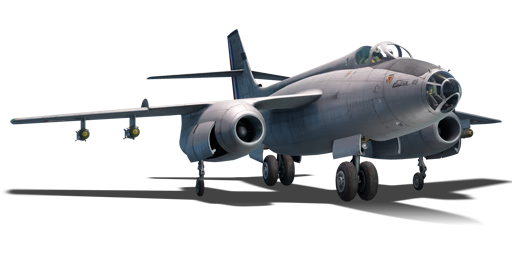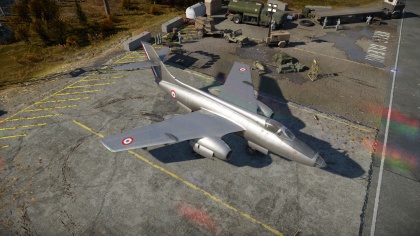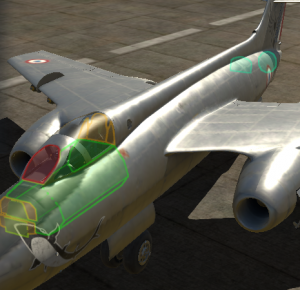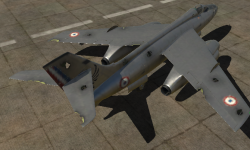Difference between revisions of "S.O.4050 Vautour IIB"
(→Flight Performance: Updated flight performance stats and added engine table) |
|||
| Line 17: | Line 17: | ||
=== Flight Performance === | === Flight Performance === | ||
<!--''Describe how the aircraft behaves in the air. Maximum speed, maneuverability, speed and allowable loads - these are the most important characteristics of the vehicle.''--> | <!--''Describe how the aircraft behaves in the air. Maximum speed, maneuverability, speed and allowable loads - these are the most important characteristics of the vehicle.''--> | ||
| + | |||
{| class="wikitable" style="text-align:center" | {| class="wikitable" style="text-align:center" | ||
| − | + | ! rowspan="2" | Characteristics | |
| − | ! | + | ! colspan="2" | Max Speed<br>(km/h at 0 m - sea level) |
| − | + | ! rowspan="2" | Max altitude<br>(metres) | |
| − | |||
| − | |||
| − | ! colspan="2" | Max Speed<br>(km/h at sea level) | ||
| − | ! rowspan="2" | Max altitude<br>( | ||
! colspan="2" | Turn time<br>(seconds) | ! colspan="2" | Turn time<br>(seconds) | ||
| − | ! colspan="2" | Rate of climb<br>( | + | ! colspan="2" | Rate of climb<br>(metres/second) |
| − | ! rowspan="2" |Take-off run<br>( | + | ! rowspan="2" | Take-off run<br>(metres) |
|- | |- | ||
| − | ! AB | + | ! AB !! RB !! AB !! RB !! AB !! RB |
| − | ! RB | ||
| − | ! AB | ||
| − | ! RB | ||
| − | ! AB | ||
| − | ! RB | ||
|- | |- | ||
| − | | | + | ! Stock |
| + | | 1,102 || 1,098 || rowspan="2" | {{Specs|ceiling}} || 32.6 || 33.2 || 43.6 || 39.7 || rowspan="2" | 900 | ||
|- | |- | ||
| − | ! | + | ! Upgraded |
| − | | | + | | 1,113 || 1,107 || 31.5 || 32.0 || 68.2 || 55.0 |
| − | |||
| − | |||
| − | |||
| − | |||
| − | |||
| − | |||
| − | |||
| − | |||
| − | |||
| − | |||
| − | |||
| − | |||
| − | |||
| − | |||
|- | |- | ||
|} | |} | ||
| Line 61: | Line 40: | ||
{| class="wikitable" style="text-align:center" | {| class="wikitable" style="text-align:center" | ||
|- | |- | ||
| − | ! colspan=" | + | ! colspan="6" | Features |
|- | |- | ||
| − | ! Combat | + | ! Combat flaps !! Take-off flaps !! Landing flaps !! Air brakes !! Arrestor gear !! Drogue chute |
| − | ! Take-off | ||
| − | ! Landing | ||
| − | ! Air brakes | ||
| − | ! Arrestor gear | ||
|- | |- | ||
| − | | ✓ || ✓ || ✓ || ✓ || X <!-- ✓ --> | + | | ✓ || ✓ || ✓ || ✓ || X || ✓ <!-- ✓ --> |
|- | |- | ||
|} | |} | ||
| Line 75: | Line 50: | ||
{| class="wikitable" style="text-align:center" | {| class="wikitable" style="text-align:center" | ||
|- | |- | ||
| − | ! colspan=" | + | ! colspan="7" | Limits |
|- | |- | ||
| − | ! rowspan="2" | | + | ! rowspan="2" | Wings (km/h) |
| − | ! rowspan="2" | Gear | + | ! rowspan="2" | Gear (km/h) |
| − | ! | + | ! colspan="3" | Flaps (km/h) |
! colspan="2" | Max Static G | ! colspan="2" | Max Static G | ||
|- | |- | ||
| − | ! + | + | ! Combat !! Take-off !! Landing !! + !! - |
| − | ! - | ||
|- | |- | ||
| − | | | + | | {{Specs|destruction|body}} || {{Specs|destruction|gear}} || 600 || 600 || 463 || ~7 || ~3 |
|- | |- | ||
|} | |} | ||
| Line 91: | Line 65: | ||
{| class="wikitable" style="text-align:center" | {| class="wikitable" style="text-align:center" | ||
|- | |- | ||
| − | ! colspan="4" | Optimal velocities | + | ! colspan="4" | Optimal velocities (km/h) |
|- | |- | ||
| − | ! Ailerons | + | ! Ailerons !! Rudder !! Elevators !! Radiator |
| − | ! Rudder | ||
| − | ! Elevators | ||
| − | ! Radiator | ||
|- | |- | ||
| − | | < | + | | < 480 || < 620 || < 590 || N/A |
|- | |- | ||
|} | |} | ||
| + | ==== Engine performance ==== | ||
{| class="wikitable" style="text-align:center" | {| class="wikitable" style="text-align:center" | ||
|- | |- | ||
| − | ! colspan="3" | | + | ! colspan="3" | Engine |
| + | ! colspan="4" | Aircraft mass | ||
| + | |- | ||
| + | ! colspan="2" | Engine name || Number | ||
| + | ! colspan="2" | Empty mass || colspan="2" | Wing loading (full fuel) | ||
|- | |- | ||
| − | + | | colspan="2" | SNECMA Atar 101E5 || 2 | |
| + | | colspan="2" | 11,500 kg || colspan="2" | 327 kg/m<sup>2</sup> | ||
|- | |- | ||
| − | ! | + | ! colspan="3" | Engine characteristics |
| − | + | ! colspan="3" | Mass with fuel (no weapons load) || rowspan="2" | Max Takeoff<br />Weight | |
| − | ! | ||
|- | |- | ||
| − | | | + | ! Weight (each) || colspan="2" | Type |
| + | ! 8m fuel || 20m fuel || 26m fuel | ||
|- | |- | ||
| − | + | | 950 kg || colspan="2" | Axial-flow turbojet | |
| + | | 12,510 kg || 13,979 kg || 14,713 kg || 21,000 kg | ||
|- | |- | ||
| − | ! | + | ! colspan="3" | {{Annotation|Maximum engine thrust @ 0 m (RB / SB)|The maximum thrust produced by each engine, while mounted in the aircraft. NOTE: Thrust varies significantly depending on speed & altitude.}} |
| − | ! | + | ! colspan="4" | Thrust to weight ratio @ 0 m (110%) |
| − | |||
|- | |- | ||
| − | | | + | ! Condition || 100% || 110% |
| + | ! 8m fuel || 20m fuel || 26m fuel || MTOW | ||
|- | |- | ||
| − | + | | ''Stationary'' || 3,322 kgf || 3,787 kgf | |
| + | | 0.60 || 0.54 || 0.51 || 0.36 | ||
|- | |- | ||
| − | + | | ''Optimal'' || 3,627 kgf<br />(1,100 km/h) || 4,135 kgf<br />(1,100 km/h) | |
| − | + | | 0.66 || 0.59 || 0.56 || 0.39 | |
| − | |||
|- | |- | ||
| − | |||
| − | |||
|} | |} | ||
[[File:Armor plates Vautour IIb.png|right|thumb|300px|Red = 50 mm Bulletproof glassYellow = 13.5 mm Steel plate Yellowish green = 6 mm Steel plate Green = 3 mm Steel plate Turquoise = 2 mm Steel plate]] | [[File:Armor plates Vautour IIb.png|right|thumb|300px|Red = 50 mm Bulletproof glassYellow = 13.5 mm Steel plate Yellowish green = 6 mm Steel plate Green = 3 mm Steel plate Turquoise = 2 mm Steel plate]] | ||
| + | |||
=== Survivability and armour === | === Survivability and armour === | ||
<!--''Examine the survivability of the aircraft. Note how vulnerable the structure is and how secure the pilot is, whether the fuel tanks are armoured. Describe the armour, if there is any, also mention the vulnerability of other critical aircraft systems.''--> | <!--''Examine the survivability of the aircraft. Note how vulnerable the structure is and how secure the pilot is, whether the fuel tanks are armoured. Describe the armour, if there is any, also mention the vulnerability of other critical aircraft systems.''--> | ||
Revision as of 19:27, 13 February 2020
Contents
| This page is about the French jet bomber S.O.4050 Vautour IIB. For other versions, see S.O.4050 Vautour IIA and Vautour IIA IDF/AF (France). |
Description
The S.O.4050 Vautour IIB is a Rank VI French jet bomber
with a battle rating of 9.7 (AB) and 9.0 (RB/SB). This aircraft was introduced in Update 1.73 "Vive la France".
General info
Flight Performance
| Characteristics | Max Speed (km/h at 0 m - sea level) |
Max altitude (metres) |
Turn time (seconds) |
Rate of climb (metres/second) |
Take-off run (metres) | |||
|---|---|---|---|---|---|---|---|---|
| AB | RB | AB | RB | AB | RB | |||
| Stock | 1,102 | 1,098 | 15000 | 32.6 | 33.2 | 43.6 | 39.7 | 900 |
| Upgraded | 1,113 | 1,107 | 31.5 | 32.0 | 68.2 | 55.0 | ||
Details
| Features | |||||
|---|---|---|---|---|---|
| Combat flaps | Take-off flaps | Landing flaps | Air brakes | Arrestor gear | Drogue chute |
| ✓ | ✓ | ✓ | ✓ | X | ✓ |
| Limits | ||||||
|---|---|---|---|---|---|---|
| Wings (km/h) | Gear (km/h) | Flaps (km/h) | Max Static G | |||
| Combat | Take-off | Landing | + | - | ||
| 0 | 425 | 600 | 600 | 463 | ~7 | ~3 |
| Optimal velocities (km/h) | |||
|---|---|---|---|
| Ailerons | Rudder | Elevators | Radiator |
| < 480 | < 620 | < 590 | N/A |
Engine performance
| Engine | Aircraft mass | |||||
|---|---|---|---|---|---|---|
| Engine name | Number | Empty mass | Wing loading (full fuel) | |||
| SNECMA Atar 101E5 | 2 | 11,500 kg | 327 kg/m2 | |||
| Engine characteristics | Mass with fuel (no weapons load) | Max Takeoff Weight | ||||
| Weight (each) | Type | 8m fuel | 20m fuel | 26m fuel | ||
| 950 kg | Axial-flow turbojet | 12,510 kg | 13,979 kg | 14,713 kg | 21,000 kg | |
| Maximum engine thrust @ 0 m (RB / SB) | Thrust to weight ratio @ 0 m (110%) | |||||
| Condition | 100% | 110% | 8m fuel | 20m fuel | 26m fuel | MTOW |
| Stationary | 3,322 kgf | 3,787 kgf | 0.60 | 0.54 | 0.51 | 0.36 |
| Optimal | 3,627 kgf (1,100 km/h) |
4,135 kgf (1,100 km/h) |
0.66 | 0.59 | 0.56 | 0.39 |
Survivability and armour
- 50 mm Bulletproof glass in front of the pilot.
- 13.5 mm Steel plate behind the pilot's head.
- 6 + 13.5 mm Steel plate in nose.
- 3 mm Steel shell surrounding the cockpit in the fuselage.
- 2 mm Steel plate behind the fuel cells.
- 2 mm Steel plate in the tail.
Armaments
Suspended armament
The S.O.4050 Vautour IIB can be outfitted with the following ordinance:
- 10 x 250 lb AN-M57 bombs (2,500 lb total)
- 10 x 500 lb AN-M64A1 bombs (5,000 lb total)
- 10 x 750 lb M117 cone 45 bombs (7,500 lb total)
- 6 x 1,000 lb AN-M65A1 Fin M129 bombs (6,000 lb total)
Usage in the battles
There are two ways you can go about using the Vautour IIb, either dive or keep your altitude from your air spawn.
- Diving
One way of playing the Vautour IIb is diving a tactic also known as rushing into a base bombing point and bombing it. Doing this can guaranteed a chance to drop a bomb at the base if the map is small enough to reach it. Following the bombing, the plane will still have a high speed due to the dive and so it can quickly withdraw back to the base to land and reload. However; this tactic doesn't work as well on larger maps where it would take a longer time to reach a base to comb. Not to mention that doing so will sacrifice altitude and cause the Vautour to be below many enemy fighters, which the Vautour cannot defend itself due to lack of armaments.
- Keeping your altitude
The other way of using the Vautour IIb is by keeping your altitude and climbing and then using your bombsight to bomb a base. Staying at a high altitude can prove safer as it can cause the Vautour to stay atop of many enemy fighters. However, bombing can be harder due to many more variables to keep account for when using the bomb sight. Getting up to altitude at standard speed can also make reaching the base harder, and so it would take a longer time to complete a bombing run. In some cases, more well-performing fighters like the F-100s can make this tactic moot as their speed will ensure they catch up and destroy the Vautour before it has a chance to drop its payload.
Manual Engine Control
| MEC elements | ||||||
|---|---|---|---|---|---|---|
| Mixer | Pitch | Radiator | Supercharger | Turbocharger | ||
| Oil | Water | Type | ||||
| Not controllable | Controllable Automatic pitch |
Controllable | Not controllable | Combined | Controllable | Not controllable |
Modules
| Tier | Flight performance | Survivability | Weaponry | |
|---|---|---|---|---|
| I | Fuselage repair | SBC-17 | ||
| II | New boosters | Compressor | Airframe | M117 |
| III | Wings repair | Engine | LBC-25 | |
| IV | G-suit | Cover |
Pros and cons
Pros:
- Insane acceleration
- Climbs exceptionally well without ordnance
- Energy retention is great
- Airbrakes, you will need them to avoid compressing in a dive
- Possesses a bombsight
- Guaranteed profit every game
- Airspawn
Cons:
- Lacks the rocket payload options of the Vautour IIA
- Compresses at high speed
- Massive penalties in-flight performance when carrying full payloads
- Turns like a brick
- Roll rate is also unimpressive
- Fragile engines; a hit to an engine will make you easy prey for enemy fighters
- Relies heavily on team support even more than the Vautour IIA does
- Massive target
- No offensive armament
- 110% will easily overheat your engines after short use
History
The S.O.4050 Vautour IIB was developed by Sud Aviation after World War Two to meet the demand for the French Armeè de l'Air. This was a challenging task, after the German occupation in France. Many aircraft design teams have scattered. France was also new to the new jet propulsion area. The requirements issued by the French government called for a jet-powered multi-role attack aircraft that can perform as a bomber, low-level attack aircraft, and an all-weather interceptor. SNCASO met those requirements with a modified version of the S.O 4000. The new plane was designated the S.O.4050 Vautour and was manufactured in three different variants. The plane would serve in the AdA for several decades before replaced the newer Dassault Mirage. The Vautour was also one of the stop-gap measures used by the AdA as a nuclear deterrent. The Vautour would later be exported to Israel and serve with the IAF to counter Egypt's IL-28 twin-engine bomber.
The IIB, which differed from the previous IIA by adding a second crew member in a transparent nose, was a dedicated bomber variant. Its prototype first flew in December 1954. In total 40 of the IIB would be built. All were sold along with all of France's Vautour IIAs to Israel in 1960.
Media
Read also
Links to the articles on the War Thunder Wiki that you think will be useful for the reader, for example,
- reference to the series of the aircraft;
- links to approximate analogues of other nations and research trees.
Sources
Paste links to sources and external resources, such as:
- topic on the official game forum;
- page on aircraft encyclopedia;
- other literature.
| SNCA SO (Société nationale des constructions aéronautiques du sud-ouest) | |
|---|---|
| Fighters | S.O.8000 Narval |
| Jet Fighters | S.O.4050 Vautour IIN (late) |
| Jet Bombers | S.O.4050 Vautour IIA · S.O.4050 Vautour IIB · S.O.4050 Vautour IIN |
| Export | Vautour IIA IDF/AF · Vautour IIA · Vautour IIN |
| France fighters | |
|---|---|
| Dewoitine | D.371 · D.371 H.S.9 · D.373 · D.500 · D.501 · Pallier's D.510 · D.520 |
| Morane-Saulnier | M.S.405C1 · M.S.406C1 · M.S.410 |
| Arsenal | V.G.33C-1 |
| Bloch | M.B.152C1 · M.B.157 |
| Caudron | C.R.714 |
| Sud-Ouest | S.O.8000 Narval |
| American | H-75A-1 · H-75A-4 · ▄P-39Q-25 · ▄P-40F-5 Lafayette · ▄P-47D-22-RE · ▄P-63C-5 · F-6C-10-NA |
| ▄F6F-5 · ▄F6F-5N · F4U-7 · ▄F8F-1B | |
| Other countries | ▄Seafire LF Mk.III · ▄Yak-3 · Challe's ▄Yak-9T · NC.900 |
| Belgium | ▄Gladiator Mk I · ▄Spitfire FR Mk XIVe |
| Netherlands | ◘Sea Fury FB 51 |







